First Series…
The
first group of stories was written in the spring of 1951. It was
inspired by the white Chinese bowl Jean and I had received (I had chosen
it) as a wedding present, and by the “Temperanza” card of Jean’s old Tarot
deck.
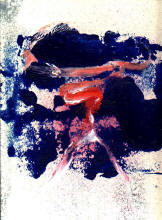 THE FRUIT
THE FRUIT
I. Just that one
day, while in strange garden, he found three peaches. Quite ordinary
ones, just ripe, just fallen, fuzzy like all peaches, with a few leaves
still clinging to the stem. Beneath a latening blue sky he found
them, and while he took them home the light ever faded, passing rapidly
into a simple sort of evening, quite ordinary, a plain twilight. By
dark the stars had come out, and the house been reached. Though a
few of the leaves were lost on the way, the fruits themselves were still
in perfect condition. He went inside and put them in a large, white,
clear but not bright bowl, where they remained the whole night.
Then,
in the morning, he ate the first peach in the faint early light of a false
dawn, just before going out into the fields again. There outside in
the dewy grass he worked, tilling an old field for the new harvest.
As time passed the sun rose ever higher in not much splendor but still
quite warm; and he worked on, hoping to finish his work before noon
(He spent always the afternoon wandering watching the day's death,
awaiting the land’s gift for his next day's meal.) However, noon
came and so, still having some way to go, he put down his tools and went
home. It was there he ate the second peach.
After
a drink of some of the exceptionally clear water found in the well by the
house, he set out on his afternoon journey. This day since the sun
was so bright, he decided to bathe in one of the deeper pools far down in
the great orchard. He returned to the house for the last peach,
thinking to eat it after his swim, in the evening light. After he
had taken the last peach, there were only a few leaves and a twig left in
the white, clear bowl.
Through the orchard he went, past the old trees, some half covered with
wild roses and with boughs broken from a century's bearing—others but
recently planted, youthful and reaching, with only a few hard fruit.
Then he passed through the last tangled roses and by the willows to the
pool.
Several people were already there, among them a girl he did not know.
She seemed amazingly lithe and strong, able to dive from the highest sunny
rocks on the further shore, only to reappear here right by his feet,
After she had done this several times, jumping out of the water in front
of him and running back to the other side where his friends were already
singing and trying to hold her among them by catching her ankles (he
noticed the sheen of her wet skin, the tiny rivulets running down her
thighs, the flooding darkness between them), he ran behind her around the
pool and dove into the water just after her, hoping to catch her beneath
the pool's surface.. She was too fast for him though, and so he swam
about waiting for her to tire—but she caught him in the water and he felt
her smooth, taut skin and the sudden press of her lips.
Having made this pact, they swam to the shore to sit in the sun to dry
before getting into their clothes. He noticed the red glimmer of her
dress nearby and how it echoed the darkness in the depths of her hair, and
he saw the golden color of her skin, so perfect a match for that peach in
his sack. He pulled it out, bit out of it and pressed the bitten
place against her skin. She said, “That is from my garden,” and they
two ate of it and ate it all there, in the late sun, and planted the seed
by the pool in the twilight, and then went home—for her home they
laughingly discovered was next his and the strange garden his own and she
his wife, there, in the evening.
*
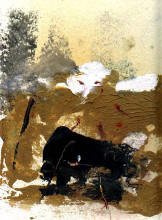 II. The grass waves
even yet where they went, and trees still grow nearby. The old stars
have moved and the orchard is gone—the new trees have only bitter apples,
the roses have long run wild in the grass and the constellations are
changed. The sun still rises, small animals remain, and bees sound
loud, high in the trees. He has gone and the girl been long
forgotten. The pool where they swam is shallow and choked with
weeds; it is an old land with the circle of the horizon grown smaller and
tighter over the years as the stars regroup. But the grass still
grows, it comes again, only to die in early summer, drying slowly to a
golden death.
II. The grass waves
even yet where they went, and trees still grow nearby. The old stars
have moved and the orchard is gone—the new trees have only bitter apples,
the roses have long run wild in the grass and the constellations are
changed. The sun still rises, small animals remain, and bees sound
loud, high in the trees. He has gone and the girl been long
forgotten. The pool where they swam is shallow and choked with
weeds; it is an old land with the circle of the horizon grown smaller and
tighter over the years as the stars regroup. But the grass still
grows, it comes again, only to die in early summer, drying slowly to a
golden death.
They
are gone now, and only the grass remains. The grass dies and each
year a new crop comes. New in every sense, for there is new kind of
grass now—like that wild barley which waved for centuries over these
western hills, but now with a secret new redness at its center. Each
grain carries a reddish mark in its heart, and the husk has changed also,
from the pale yellow of straw to the orange of evening. Red is the
late color of the stalks, as summer moves on into fall. But when the
new shoots break the surface of the earth—how great a weight of old straw
and dead flowers, the mulch of the years, have they to penetrate—there is
a faint pink line over the leaf, the delicate vein of new life reaching up
from the sprouting seed. From that moment the grass grows stronger
and stronger, reaching for the new-late sun, turning, burgeoning in its
warming light. Already the secret seeds of the endless future lie in
its heart; and as the year moves (how short a season now!) those seeds
burst forth. Suddenly the quick dry heat will burn to the core, and
the grain will be ready, ready for death, for lying in the earth, drying,
and waiting for certain rain. Drying, and waiting for rain the grass
remains. Red is the late color of the stalks as summer moves on into
fall.
The
world is waiting for them to come again and leave another seed, for the
first failed to grow. Cast over the hills are the figures of the
lost, and in the tree's shadows are their faces. In the curve of the
earth is that curved breast, and in the little valley flows a running
stream. The grass is blowing, and in the fitful gusts it waits for
the past to come, for the absent to return.
They
will come again over the hill—and behind them the sun will rise, the
figures of fate frozen forever in a sign of departure. For this will
be an eternal moment, this time when the grass casts its seed. They
will walk over the hill and greet us, will tell of all the things that
happened, of how time fared with them; and we will tell of the new grain
with the red at its heart. They will speak of the places beyond this
place and of people they knew there, and we will tell of how the grass
still grows from seed to seed on through the years. They will tell
of the births of children and of the lives of old men, and we will show
them the grass blowing in the wind, waving, waving far beyond the hill,
waving to the sky.
*
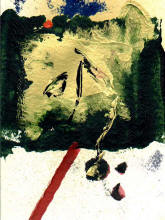 III. Sadder and
wiser the dog came home. We asked him where he had been, who he had
seen, but his voice was gone. Only the look of his eyes could tell
us anything, and in that look was the mark of death, a faint sign of
catastrophe. He barked, but the sound meant nothing, we couldn’t
tell what he wanted. There were some strange looking burrs like none
which ever grew within the circle of our place caught in his coat; and
there was a leaf covered with odd marks caught in the fur of a leg, the
chiromancy of another world, the shapes of a strange map, the lines of an
unknown hand…
III. Sadder and
wiser the dog came home. We asked him where he had been, who he had
seen, but his voice was gone. Only the look of his eyes could tell
us anything, and in that look was the mark of death, a faint sign of
catastrophe. He barked, but the sound meant nothing, we couldn’t
tell what he wanted. There were some strange looking burrs like none
which ever grew within the circle of our place caught in his coat; and
there was a leaf covered with odd marks caught in the fur of a leg, the
chiromancy of another world, the shapes of a strange map, the lines of an
unknown hand…
Anyway, we followed as he led, and found by the edge in the grass two old
copper jugs, and in one a few drops of water. Two jugs in the grass,
and Eieron told us this story—
La Temperanza
She was only ten when she found the old jug lying in the field.
There was no one around, the fields were all silent. Looking
inside, she saw lurking in the bottom a little water, which cast her
face back to her. It seemed clear enough, so she drank a bit, and
then, picking up the dark bottle, she took it home. Her mother
noticed she was carrying something as she came up the path, and called
out, asking what it was. “A bottle I found in the field,” the girl
answered. Her mother looked, and yes, the girl did carry an old
copper bottle, holding its weight in both hands. Asking the girl
where she had got it, the mother said she had never seen the like, and
learned of the quiet field and the discovery in the grass. Then
the mother put the bottle above the fireplace, and as the men came in
from the fields she forgot all about it.
But
the girl did not, and daily took down the bottle in an attempt to
decipher the strange marks on its sides, and to gaze on her reflection
in the ever renewed liquor in its bottom. As the years passed and
the liquor rose in her own body, she slowly forgot that secret fluid in
the bottom of the bottle she had found when a child. And it seemed
as she grew older that the sun burned ever brighter, and as the men came
in from the fields a dark look passed between the younger ones and
herself.
The
men had been boys too, and one of them, lost one day in woods, found an
old copper bottle by a high rock, and brought it home, never telling
anyone. He saw his face deep within: an older, stronger
countenance than now. Stronger, hazed in gold, brown as his face
was not now. In other years he remembered this find, looking
occasionally, secretly into its depth; and when the first dark look
passed between himself and the girl, he recalled the vertiginous future
first seen there.
One
day as he was working in the field the girl appeared carrying water to
the men, and as she came up before him he recognized its container: the
jug he had found near here so many years ago. Yet this could not
be it, for only the night before had looked into its depth and seen
there that image which he so often saw now, of a body lined with
unfathomable need and unquenchable thirst. He felt it the sign for
that strong dark dream that often swept upon him of wandering forever
aimlessly across the oceans of the world. There was a light far in
the journey, a dim apocalypse; and he was barred from it by dark rooms,
a yearning beneath towers and swinging, faint red lights.
But
this could not be his jug. Before he knew, he drank from it (he
had never his own) and a great ocean rushed through him and bore him out
past a slow heaving of the ground swell to the flickering sun of a far,
clear sea. That night he met her beneath a tree, and she had the
bottle by her—he knew why—and he had brought his and they mingled the
waters and the river reached the sea at last, losing itself, drowning in
a vast rush of yearning, requited, washed by waves that could never end.
For these were the bottles of the waters of life, streaming ceaselessly
from one to the other, womb water and semen, the clear, deep open sea
and the white turbulence of its shore.
And
another later time a girl found the two bottles and began to pour the
waters from one to the other and as she grew older the people knew and
some hated her, throwing stones until finally everyone did and she died,
the water trickling away down the gutter.
Well, we took the jugs home, and the kids play with them sometimes.
*
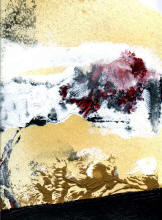 IV.
He spent always the afternoon
wandering, watching the day’s death, and waiting the gift of the land for
the next day’s meal.
IV.
He spent always the afternoon
wandering, watching the day’s death, and waiting the gift of the land for
the next day’s meal.
He
wandered in the sun, his browned skin warm in the afternoon light.
His graying hair and his blue eyes with wrinkles about them gave witness
to the advance of years. The passions of youth were gone, and lust
had left him empty. His muscles were still hard, his heart beat
strongly as ever, but the phallus was older now, graying there too. As he
strode to the water he thought of the other times and who he had done this
with when young. The breathless plunge, the shock of cold water, all
brought back to him the wild hard strength of his youth—but he was older
now, thinner, and he walked the ways of the world with a trifling stoop,
the faintest shortness of breath. He mostly lived in cities now,
their concrete and steel seemed somehow more fitting to his present stage.
And the pool into which he plunged was no longer the moss lined one of the
forests but only the concrete swimming tank of a public plunge.
He
watched the young boys swimming boisterously down at the far end of the
pool, and saw the young men near by come up from the bottom blowing, with
the water streaming down their chests and flanks. The graying hair
on his chest, the thinness of his legs, these set him apart, and the young
men wondered what he was doing here, what he wanted. He also
wondered this, for it was already the afternoon.
He
watched as the young men proved their truly singular athletic prowess for
the benefit of the girls, and watched as they slowly left the pool, left
for home or date, walking out into the blazing noonday sun. He saw
the bright white light of noon strike their faces, the glow it left
there, and knew that when he left the pool and went through that door,
only the gold of late afternoon would graciously hide his graying hair and
wrinkled brow.
One
girl had stayed behind, apparently waiting for him for when he stepped
into his clothes and made for the door, she followed him and smiled.
That other girl, long ago, whom he had chased into the evening fled before
his eyes, and he recognized the fatality of this one, too. So he
welcomed her, and then in the golden afternoon sun (he was son of these
afternoons, he their true offspring) he went in unto her—went in as she
pitied him, his sense of fatal conclusion, his knowledge that this was the
last. And, that his dying should not go on, out pity for the
afternoon, she killed him there and left him lying, the blood welling
through his graying hair and the white phallus broken.
*
There was a story here about the girl, how she moved to the city but the
country people remembered her and sent her nostalgic letters. The story is
lost
The 1951 Stories, Second Series…
I wrote
more stories over the next few months of 1951. The "Stories of Bird
Life" is an arrangement of the second group of stories.
SOME STORIES OF BIRD LIFE
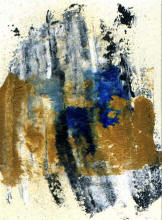 I. The Fields
I. The Fields
John looked at the trees blowing, and saw forecast again another clear
afternoon. But here in the hazy morning lay his job: to cut through
another ten acres of rye before noon. Then he could go back for
lunch, and maybe swim in the lake over by the far hills in the afternoon.
Already he was burnt dark, and each day added a slightly deeper tone to
his earthen skin, and as he stripped his shirt the pull of the brown
muscles was echoed in the rye, suddenly waving in the wind's first huge
gust. And the eucalyptus above his head waved largely too as he
recalled how it had been above him and the girl yesterday as they lay on
the hard dry leaves with the scattered empty seed pods about.
--The King of France, having
been lost by his party while hunting in Burgundian forests, shot a white
doe and skinned her himself so that he could roast a flank on his tiny
fire. In the evening, having eaten, he heard a faint sound, and
saw a pale faun quaking in the alders. This faun passed to his son
when the King died in the Battle of Aix, 1031--
But
now, in the rye field, and cutting the grain in the bright, hazy sun.
He liked the hot, hard iron seat, and the brushing caress of the grain
against his thigh just before it struck the blade, just before it fell.
He thought of the girl again, and her rustling pale blue dress, how tight
it had been pulled, and he saw her again, coming toward him by .the cool
green waters as he lay nude on the bank—the white of his thigh caught in
the sun's white rays.
King Gustaf III of Sweden went
riding out to war, and killed he many doughty men 'fore he himself lay
o'er.
He
saw that he had not been watching and that behind him lay a crooked swath:
it would cause trouble the next time around. His father would be
angry, that hard wall between them grew constantly now, and he saw a
coming end, that he would leave, and go back down to the city, to see what
he could find there.
But,
anyhow, here in the meantime the sun grew warmer yet, and the slow sweat
trickled down from his armpits and in the small of his back, in the hairy
places of his body. He was large, larger than his brothers by at
least a head, and this had always stood him in good stead in the rough
fights among the 1aborers of the road. Once he had nearly been
beaten, which would have meant at least a cracked skull and a few lost
teeth, but he had suddenly realized at last by its hardness his opponent's
only vulnerable spot. He kicked him, and left him writhing there.
A King of France was jousting,
and in the stands the maid, so as the joust went turning, turning toward
his life, he quickly turned upon his horse, he turned it round about,
and speared the other's horse quite through, and then and there he him
he slew. For then that knight's dear maid he knew; for then come
dark to tower, for then come night to France, for then that King that
maid he knew, and bore she soon a son to rule o'er his father's death,
for him he slew quite soon.
He
would go down to the city, to San Francisco probably, there by the water
front where all the whores were…yes, it would be a swell life, they would
like him, girls always did.
And Sweden's King lay in his
bed, for that the Queen should know, he said, what to expect when the
maids came.
Anyhow, this afternoon he would go down by the lake and swim for a while,
the burning cold water would cut his flesh like neither sun nor woman ever
could.
After
lunch he rode down on the only horse the ranch still possessed—his father
had sold all the others as the family grew slowly poorer, in the beginning
thinking to buy machinery, but knowing now that this would never save him
either. The old man grew ever more bitter, especially toward his
over handsome eldest son who was far too interested in farming the local
maids to pay much attention to his own fields. Well, anyway, there
was at least this one horse left, and John rode it frequently for he liked
to feel the smooth ripple of its flesh between his knees. It would
be good down there in the water this afternoon: the air was clear now and
he could see a very great distance in all directions—the sight cut
the eye like a glass knife: a great clear sharpness a myriad miles in
every way, and in the distance the burnt gold hills with the blue eroded
crotch. He came to the green now, to a tiny stream which fed the
lake, here beneath two huge swellings of earth, and the heat was thrown in
his face and against his body like the flames of the sun itself—he loved
this burning union with the harsh dry grass, and he strode into it and
opened his fly and pissed in the burnt, sharp straw and then took off his
pants and dove into the clear wild water.
The King of France went against
the English---for now he had the all of Burgundy and Aix, Lombardy and
Avignon—and caused he to be made great ships for the Channel, for he did
dearly love the water and its waves. And as they went out upon the
waters a great storm came and they all drowned, there amid the wet,
crashing ice.
Later
the girl came, as the sun turned the shadows ever sharper and longer (her
tight blue dress like the color of sky near the horizon, her breasts like
the hills of her home.) She remembered the handsome nude fellow of
yesterday and his body the dark color of burnt rye, except for the
paleness at the core of each. Over the hill she came, and looked
down, and saw there, by the shore, a brown form floating, face awash and
turned to the sun, and with white thighs, with dark at their center.
The King of Sweden died in
battle with the Russ, the ice opened and took him, he floated for a
dozen days before his body sank.
*
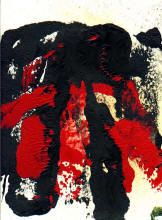 II. A Bleak Tattoo
II. A Bleak Tattoo
“You
never know what you'll find in these dark alleys,” and, no, he did not.
He had started in the afternoon, and now it was evening. The long slow
hours of a summer day's death had passed, and he wandered on alone.
Walking down the hill, the cross-streets became ever more important, and
the street he took always more narrow. Chinatown was long past and the
Commission district lay all around. Few people were here at this
time: 5:00 A.M. was the hour here, and in the late afternoon only
the lengthening shadows, a few loafers outside the liquor store on the
corner, and some children playing in the gutter inhabited the place.
A man came running down the street, through the flashing late-warm sun, a
dirty torn T-shirt and a heavy brown arm tattooed with a dark bird.
He ran over to the men lounging in the sun on a far corner, shouting,
“John, you old son of a bitch, where the hell ya been?” and was greeted
with loud joy as the light turned ever darker and the fog fell.
Later
that night, as he wandered through the area south of Market, out past the
bums, the tawdry bars to the great old brick warehouses and the tanks of
an industrial operation, it seemed that the world turned ever darker
before him, and the way ever more alone. That was the meaning of
this black waste: the dark bird on a rough arm was his and he knew then
that his was the hunger. He knew his fate, and recognized its
companions: to walk on the dark side, to wander the low places of the
world and to float at last over the rim unto death. He would give it
up, and put on the dirty, torn clothes, the dark costume of the lost.
Walking down this street he would let go the will's last grip; and death
would come beneath the mark of a black bird on a plunging punching arm
driving on forever in a lonely city square with old poplars planted around
it.
I
waited maybe fifteen minutes there, at that table in the dark (all the
light was on the bar and the rolling spotted dice). Someone with a
strange narrow face, high cheek bones and sharp, long eyes came in from
the night wearing a dark pea coat. It was E--, I recognized him
immediately as he went up to the light and the bar and the others and the
dice. They noisily greeted him, slapping his back; and called for
another drink. A few minutes passed, and I walked up to the bar
myself, touched him on the shoulder and spoke his name. He turned
from the light and said, "Oh, hello, Fred." I asked if he knew of
somewhere close where I could sleep, and we went outside. He put his
dark-sleeved arm on my shoulder, and the wings folded: they were mine now
for I too now wore a beaked bird on my arm, and as its talons cut my soul
the sun rose.
*
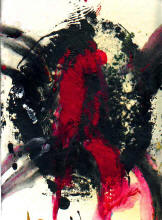 III. The Tattoo Artist
III. The Tattoo Artist
Jake had been in the
business—profession that is—ten years now. He had a catalog of
one-hundred and fifty designs and he had put them on innumerable arms,
chests, backs and other parts of the male body. He had all kinds of
designs, arranged in forty-two categories—dancing girls, army, navy, and
marine emblems, “mother” scripts, etc. And he even had some that he
had made up himself, and it was for these that he was so popular. Each of
these original designs was copyrighted, and only he could use it.
For instance that one of the hawk burning in the fire was only to be found
in his stock. It was one of his best, not the most popular, but for the
right man it was really good.
One
of the men on the ship told him about Jake one day as they were taking
showers. He had noticed the black saw-toothed spiral on the guy's
arm before, but now he got a good look at that thing on his chest: a huge
bird, with feathers like scimitars and talons like the nails of a man six
months dead. Buried in the hair of his chest, it was hard to see;
but it still looked good. He asked him where he got it, and heard
about Jake's place in New York. When the ship docked he looked it up
in the phone book and went down there to see what he could get for
himself.
It
was a pretty crummy neighborhood, and the big signs with eyes painted on
them didn't help. Here in the dark, the way they lit up, with the
faint red lights above and the pimps standing in the doorways below, it
really gave you the creeps. He had the address in his pocket, and
stopping in the light of a doorway to check, the smell of the fat old
woman who lurched out almost suffocated him there in the still, hot air.
Forgetting the tattoo artist, he followed her for the moment as she turned
down always the darker side streets until finally she stopped under a
pointed light and he came up to her.
“Hello, sailor,” she said, and opened a door there beneath the light, and
he passed inside through the narrow arch between the fat columns.
Within the room the odor of old perfume again assailed him, and as she let
down her hair the darkness came, and the red flood fell through him like
the sea through the old caves of its shore. She turned out the light
as he took off his cap and as her lips crept down he felt the first great
knife in his chest: for Jake was carving a design there, and the first
feather was yet to be blacked in.
*
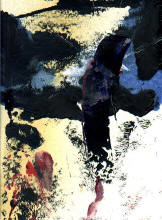 IV. Annunciation
IV. Annunciation
Up here on the top floor the
air was cool; cool with a crystalline clarity seldom found elsewhere.
Yes, this was the perfect spot for stargazing, for poring over old maps of
the heavens and sometimes reading odd accounts of life on distant worlds.
In the geometry of these maps and in the perfection of the forms which
they indicated he could feel the world's pulse, and in the strange tales
of far away planets he felt that he knew her inmost secrets. Though
these pleasures might seem limited only to scholars like himself, not even
the most vulgar laborer could deny the stimulating air up here and the
almost vertiginous view of the starry vault available from this vantage
point, That was what the sky, his kingdom, was, it was a starry
vault, and it was also a map of the world. The world was this order
and rhythm and form, and the world was a harmony which surely lay within
his comprehension. The world was a music, and that music was of the
spheres, an ineffable melody which he could always hear as it sang there
in the silence.
Of a
night he would sit there listening and thinking of the forms of the world:
occasionally of the circle, and its need for a square, and mostly of the
sublime triangle rising from the flames. He would listen and dream
in the silence; and as he gazed upon the heavens, plotting the paths of
planets, he would see the scheme of stars and the patterns of the universe
and sometimes just before waking would dream of the moon setting in a sea
with a great silver path before it and of the ship which floated on the
verge. He could never quite remember this dream next morning, but he
always woke from it with a fearful feeling and would study next day the
paths of comets with exceptional assiduity. He picked comets for
this study not only because they were a flaming portent, but also because
he knew the numbers of their lives.
Sometimes, gazing down from the house top, he would see activity below,
and would watch the people moving about: a garbage man emptying cans and a
laborer digging holes in the road. He would see women peeking from
behind curtains as the men pulled off their shirts in the summer heat, and
he saw the men's huge arms and broad chests with the hair upon them and
with the tattoo of a bird graved black beneath its matted cover. A
dream like that of the setting moon would come upon him at such times but
it would be of a bird which tore his face.
Sometimes he considered that business of the triangle born from the
flames. This was an interesting train of thought, because the fire
was obviously a doctrinal error: everyone knew that the triangle had no
birth and reigned unscathed through eternity. The very idea of the
birth of the triangle in so ephemeral a substance as fire was not even a
heresy, it was a joke. Thus he studied in his tiny cubicle the whole
day through, gazing during the night’s early hours on the flight of stars
and the circling paths of lawful planets, and as night drifted into day
dreaming of the waning moon and of its descent into the sea.
One
day he saw in a book some orators who stood in the park and made speeches
on education and politics. He had been reading a great deal lately
to the effect that the fire was really necessary to the triangle's birth,
and this had hurt him deeply. So he decided to go out and give
speeches himself. But he would not speak in the park. He would
merely stand down in the street outside and tell the first person who
passed of the fundamental origin of geometry and of the falsity of fire.
He went downstairs and outside for the first time in years and saw a
laborer standing before the door in the hot sun. He addressed him,
saying, “Did you know of the ineffectualness of fire?” The man threw
him upon the ground and beat him and left him there in the gutter, his
face torn and his jaw broken with the blood trickling from the side of his
mouth.
*
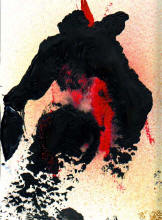 V.
The Talons
V.
The Talons
He had been sitting all night
in this bar, waiting. Not quite sure what for, either. A girl
had told him she might meet him, but he never cared much for girls—for he
knew his own inadequacies. No, he didn't notice much what they said,
or ever bother to carry it out. He'd been mostly amused by her
suggestion that they meet—Christ, she'd chased him enough lately to take
the joke out; but, still, a few more times perhaps. Girls were
funny, too bad they weren't clean like men. But for an insufficient
guy like himself that was the best that could be expected. Sure, he
was afraid, afraid of what a girl might do, afraid of that pasty white
flesh with its clammy sourness. But this damn girl was really a
case. What did she want, didn't she know that women didn't like him?
What could he do with such a bitch? Several people had told him, of
course—a free lay was never to be turned down they claimed, and carried
condoms in their pockets so they wouldn't have to in case the opportunity
arose, which seemed seldom, judging from the tattered wrappers.
Perhaps this would be the time to make a break—under the sign of a great,
bloody bird, with harsh torn feathers and red upon its claws. The
tearing beak would lunge toward him, and as the skin broke, release would
come.
This
bird was kept in a cage near the end of the room, down there in the dark
part. Here by the window—a rotten view of old trash cans and dirty
stovepipes—you would never know the bird was in the room. Sure,
there was a rustling like coiling snakes, and the clattering scratch of
claws upon the floor, but then there were cats all over nowadays, and you
could hear them anywhere any time. There was a smell, too that
carrion smell which sometimes burnt the nostrils unbearably—but it went
away, and, after all, wasn't there a string of twenty cans overflowing
with garbage just outside his window? The crashing of glass and the
falling of old tin was the dogs there rummaging; and the stink of a dying
fetus was only rotting cabbage, anyone would say so. He couldn't see the
tiny lights of the eyes down there in the dark—and if they were pointed
out he said he was sorry, but living up here in the light, in the good
part of the world, had made him unfit for staring at the dark.
There
was that arm with the bird on it—now that was a mystery, and he
thought about it daily. What did it mean, and why was he so shaken
by it? He had always been kind of thin but anyone cooped up in
this ratty room would be too, and pale besides—and those huge arms of the
garbage men would sometimes shake his loins until he fell down and writhed
upon the floor and that thing in the corner would sure scream then.
But
it was only a cat outside, the sex habits of the feline were a joke to
watch. After he rubbed a little place clear on the window and looked
out, there’d be a couple of cats balancing back and forth on the fence
opposite and they really had to balance too, the fence may be
narrow, but the glass put them under water in a strong current, besides.
The
sex habits of everything were sure a joke to behold. And sometimes
while watching he would feel the shiver run over him, and would turn to
see two tiny lights staring unblinking, and a black feather lying on the
floor way back there, just at the edge of the light. But there
wasn't anything there and he would fall to thinking of that arm, with the
tattoo on it, and would wish that it would punch him in the belly.
Sometimes he went outside, for the air he said—though he secretly
preferred the air in the room, he knew the odor there, and he never knew
what he might come across out here. But his friends all went out to
get a bit of fresh air, so they said, and so he had to also.
Occasionally he would see girls on these walks, and he would shake with
fear, for he knew that they were forbidden him and that he should look the
other way. He looked at their fat arms and tight, short dresses, the
funny way they snapped in the wind as they stamped their little feet and
their curls shook. How crazy they were, there between the legs, it
looked like they had been cut off. (He looked at himself in his
cracked mirror sometimes, and watched the thing stiffen and rise as
something in the corner tore at its cage and rattled its black harsh
wings: the claws would grind on the floor and the beak tear at the boards
until the blood came in the eye as the screams shook the room. And
then, frightened, he would put his clothes on and go out, the odor burning
the air.)
He
noticed a restlessness in the dark when he thought of the laborer's arm,
too—but he was his room's only inhabitant and he didn't like pets,
especially birds.
Outside here in the late afternoon it was really rather pleasant. He
had found a little park on the hill (he hadn't known that parks existed
till this moment) and sat there on a bench in the late sun, looking out
over the city, a tumultuous, smoking debris reaching to the horizon.
The country must be nice, he thought. He had heard of the country,
for once he had found a magazine lying at his door, delivered by an
accidental fall from a passing rubbish truck. In this magazine had
been pictures of "Olmstead Manor and Park," where little children dressed
prettily in lace played beneath the trees of a high noon, and the neat
chimneys of Olmstead Manor smoked with tiny curlicues above mullioned
windows. He hadn't quite gotten the point, but supposed it must be
lovely. Yes, the afternoon was pleasant here, but the sun soon
sank—a blood red ball dropped into the hairy, smoky mass of the town, a
black crepuscule. He got up to leave and saw a girl on the bench
next his. She had been watching him, he could tell; and he walked quickly
away looking in the opposite direction.
When
they reached his room, he opened the door and let her go in first, warning
her about the far corner, that there in the dark the floor was unsafe and
one was never to venture near. But she paid no attention and walked
over into the dark making cooing sounds and he looked quickly out the
window and saw that the trash cans were gone the street was empty.
There wouldn't be anyone come here anymore, his only distinction was gone,
now the place was really untenable; but he couldn't go away, this was
home, his only home (who has two?). Then the girl came over near him
and he smelled her, a flower which dreamt that same burnt dream he always
knew: though the cans were gone the acrid odor still drifted over the
room, and something clawed its perch in the corner. She undid her
dress, lay down upon the bed, and beckoned to him: he came near and she
caught and opened his belt and pulled him down upon her and the great bird
screamed as his pants fell and the laborer's arm flashed in the dying
light. She had stood before him, her breasts risen high; she was a
mountain and she shone white in the late light as the carrion smell burnt
to his soul. And as she lay now beside him the cage overturned and a
dark bird's red claws and black beak tore his heart; he knew her as the
talons cut his soul and the sun rose for a morning.
*
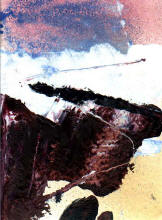 VI. The Estuary
VI. The Estuary
And as the sun rose for a morning that girl left, and though he waited she
never came back. During the first week it hadn't worried him; his
friends told him they are a hell of a lot harder to shake off than on, and
that all he need do was wait--don't even make a sign of willingness—and
she would crawl back soon enough. But now it had been weeks since
she failed to appear that night in the bar. So he went to her room
(she had insisted on telling him where it was, once when they sat on the
ocean's shore); and the people there said that no such person had ever
lived there, that he must have the wrong place…
He
decided to change his life. No, he wouldn't even bother to go back
to his old room: the stuff there could be thrown out by the landlady as
well as by himself, and he was sure he wouldn't be needing it. He
was unable to make up his mind as to what he should do, so he decided just
to wander for a while, to start out and let chance guide his destination.
The chief thing was that he was now at home anywhere for on his chest
where the claws had entered and the beak had torn lay now the shape of the
bird itself. Yes, he was now complete, and his present world
wandering was the result —and the result also of a little gnawing question
as to what had really happened to the girl; where had she really gone?
So he
walked around the city, and would watch the vistas reflected in store
windows to see if he could find her in the quivering spaces behind him.
Though sometimes in the flash of a sunlit dress or the shimmer of light on
water he thought he saw her face, and though in many places he suspected
her secret presence by a faint odor in the air, the secret scent of dying
flowers, yet he never could find her. Finally he left town, and
looked in the country, under great old eucalyptus trees and among redwoods
dying in chasms by the sea, and in the streaming high white clouds and in
the songs of swallows, but she wasn't there either. And then he came
at last to the vast flat marshes of a river's mouth, and found a gray
house lost in tall windy grass. He decided to give up and remain
here till death found the place, for there was no point in going further.
So he lay down in his bed and heard through the night the pounding of
distant surf and gulls crying above his head…
And
the Lord of the Western Marches sat upon his throne in the sunset castle
by the sea, and the sky's verge was darkened now to dimmest red, and the
deep red blue which flooded the great hall was the last light which would
be seen for many years to come He was the Lord of the Western
Marches, the vast wide place where the grass whispers and the dead retell
old tales. There on the infinite red barred horizon lay his regal
stamp, and in the last white touches of light upon the topmost towers of
his palace the souls could see the marks of his power. It was he who
held the keys, and he who knew where the road led which lay beyond those
gates and walls; he knew where the sun fell, and he, Count West-West, Lord
of the Orient Light and of the Western Marches, could choose a man go to
upon that road.
The Lord
sat on his throne in the great hall, and the dying sun gilded the high
roof beams: the marks upon them sprang into boldest relief, the squares
and circles, triangles and flames cut the eye with the white brilliance of
their contrast at such times as these, while the Great Lord smiled.
He
came up and 1ay prostrate before the Lord as the voices ever ascended in
the high arches of the roof; and the Lord stepped down from that Golden
Throne and took him by the hand to where a window looked out upon the
verge. There in the crimson light lay the marshes and the river
streaming deep and black past his door (and the birds flew in great flocks
over head as others ran in the surf)—but out there, at the shore, lay the
gleaming sea and the last burning white of the waves as they swept upon
the sand. There was the estuary and the river's mouth, and the Lord
gestured out to the red horizon and the sun's last flame there: and as
night fell did that great Lord of the Western Marches, Count West-West,
the Keeper of the Orient Light, press into his hand a tiny stone, a
turquoise egg which he himself, the mighty Keeper of the Keys of the Gates
of Paradise, had found only that afternoon while walking in the wind upon
the shore.